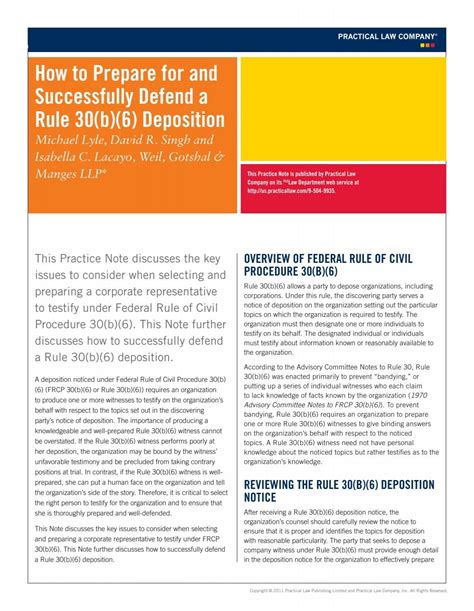How To Defend A Deposition
Ronan Farrow
Mar 31, 2025 · 3 min read

Table of Contents
How to Defend a Deposition: A Comprehensive Guide
Navigating the complexities of a deposition can be daunting, especially if you're unprepared. This guide provides a structured approach to help you effectively defend yourself during this critical stage of litigation. Understanding your rights and responsibilities is paramount to protecting your interests.
Understanding the Deposition Process
A deposition is a pre-trial discovery process where you'll be questioned under oath by the opposing attorney. This testimony is recorded and can be used in court. Your performance in the deposition can significantly impact the outcome of your case.
Key Aspects to Remember:
- Preparation is Key: Thorough preparation is the cornerstone of a successful deposition defense. This includes reviewing all relevant documents, discussing the case strategy with your attorney, and practicing answering questions.
- Your Rights: Remember you have the right to consult with your attorney before answering any question. You can also object to improper questions.
- The Role of Your Attorney: Your attorney will be present to advise you, object to inappropriate questions, and protect your rights. They are your advocate throughout the process.
Strategies for a Strong Deposition Defense
1. Know Your Case Inside and Out
This is arguably the most important step. You need a firm grasp of the facts, dates, documents, and any other relevant information pertinent to the case. The better you understand your case, the more confidently you can respond to questions.
2. Listen Carefully and Answer Directly
Don't rush your answers. Take a moment to process the question before responding directly and truthfully. Avoid speculation or guessing. If you don't know the answer, simply state that you don't know. Avoid ambiguous statements that could be misinterpreted later.
3. Use the "Five W's and H" Technique
When responding, structure your answers to include who, what, where, when, why, and how, providing a comprehensive and clear response to the question asked.
4. Master the Art of Objection
While your attorney will be handling objections, understanding common objections is crucial. These might include:
- Leading: When a question suggests the answer.
- Ambiguous: When the question is unclear.
- Calls for Speculation: When a question requires you to guess or speculate.
- Beyond the Scope: When a question goes beyond the parameters of the case.
5. Maintain Your Composure
Remain calm and professional, even under pressure. Avoid emotional outbursts or aggressive behavior. This can damage your credibility and hurt your case.
6. Document Everything
Keep a detailed record of all questions asked and your answers. This will be invaluable in preparing for trial.
Frequently Asked Questions (FAQs)
Q: Can I bring notes to the deposition?
A: Usually, yes, but only those documents pre-approved by your attorney.
Q: What if I make a mistake during the deposition?
A: Your attorney can help clarify or correct any misstatements.
Q: How long does a deposition last?
A: The length varies significantly, depending on the complexity of the case.
Q: What happens if I refuse to answer a question?
A: Refusal to answer can have serious consequences, so it's crucial to consult your attorney immediately.
Conclusion: Preparation Prevents Poor Performance
A well-prepared deposition defense is crucial to protecting your interests. By understanding the process, employing effective strategies, and working closely with your attorney, you can navigate this critical stage of litigation with confidence. Remember, preparation is your strongest weapon.
Featured Posts
Also read the following articles
| Article Title | Date |
|---|---|
| How To Get Misdemeanor Dismissed | Mar 31, 2025 |
| How To Finish Walnut Without Darkening | Mar 31, 2025 |
| How To Condition Nubuck Leather | Mar 31, 2025 |
| How To Get A Copy Of Your Mc Authority Certificate | Mar 31, 2025 |
| How To Get Rid Of Foam In Hot Tub Naturally | Mar 31, 2025 |
Latest Posts
-
How High To Hang Clock With A 9 Foot Ceiling
Apr 04, 2025
-
How High The Moon Music Sheet
Apr 04, 2025
-
How High Should Transmission Temp Be
Apr 04, 2025
-
How High Should Cabinets Be Above Washer And Dryer
Apr 04, 2025
-
How High Should A Roof Be Over A Grill
Apr 04, 2025
Thank you for visiting our website which covers about How To Defend A Deposition . We hope the information provided has been useful to you. Feel free to contact us if you have any questions or need further assistance. See you next time and don't miss to bookmark.
